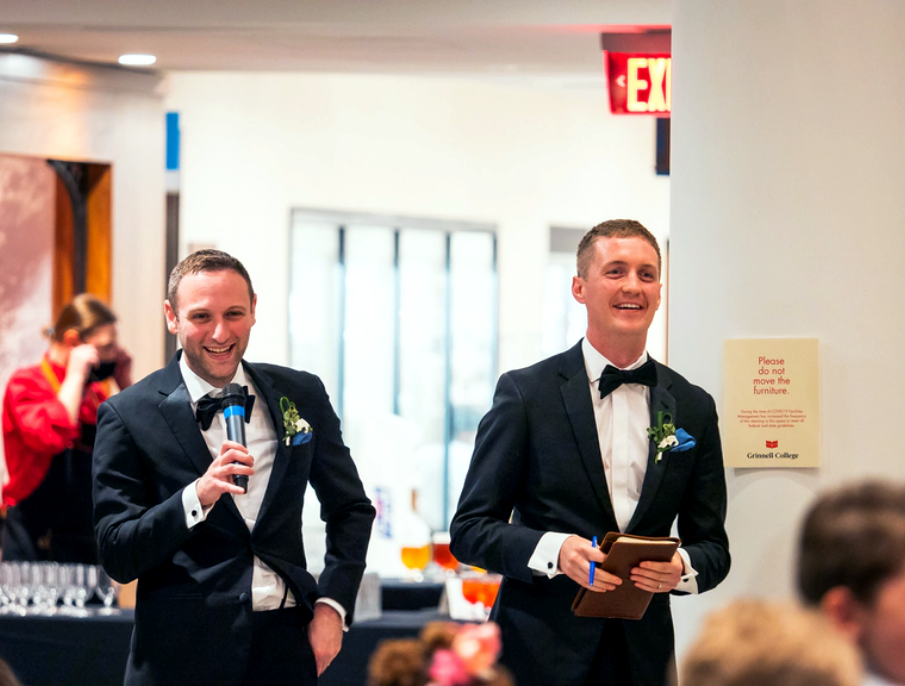On Oct. 16, in the atrium of the Humanities and Social Sciences Center (HSSC), Austin Frerick `12 and his groom became the first couple — though certainly not the last — to marry in the HSSC.
“I’m forever grateful to Grinnell. A Liberal arts education forever changed my life,” said Frerick on his choice of venue. His husband, a Middlebury graduate, agreed with the sentiment. “We actually got engaged in Middlebury and married in Grinnell.”
An extraordinary venue is not the only thing Frerick took away from his time at Grinnell. On Jan. 27, four months after his wedding, Frerick announced his candidacy for Iowa State Senate District 37, a move he credits in-part to the education he received at Grinnell. District 37, in Cedar Rapids and Marion, is a newly made district with no incumbent.
In 2018, Frerick ran an unsuccessful campaign to represent Iowa’s 3rd Congressional District. He dropped out three months before the Democratic primary. Cindy Axne, who won that primary, currently represents the 3rd Congressional District in the U.S. House of Representatives.
In his State Senate platform, Frerick advocates for increasing the minimum wage beyond Iowa’s $7.25 an hour, expanding funds for K-12 education and creating universal child-care. But Frerick has been most vocal about a different issue which touches close to home for him: the proliferation of industrial animal facilities (CAFOs) and corporate consolidation of farming.
“In my lifetime in Iowa, I’ve seen the collapse of the family farm. You used to drive and you’d see cows and you’d see pigs. You don’t see animals anymore,” he said. “I think it’s one of the worst things that happened in modern Iowa history.”
Frerick’s interest in agricultural advocacy stemmed from his childhood spending time on his grandfather’s farm. This interest only deepened at Grinnell.
In 2011, Frerick completed two Mentored Advanced Projects (MAP) on Iowa slaughterhouse towns and the effects of large meatpacking factories on rural school districts. Slaughterhouse towns are characterized by small, rural populations where the largest employer is a slaughterhouse or industrial farming plant.
These towns pervade Iowa. In Columbus Junction, a slaughterhouse town profiled in Frerick’s MAP, over 1,000 people are employed by a Tyson Foods meat processing plant. Columbus Junction has a total population of only 1,883.
While completing the MAPs, Frerick said he developed an ideological framework that is skeptical of corporate consolidation.
“I think collectively rural Iowa is basically an extraction colony at this point. And we’re Stockholm Syndrome. People fought power and they lost.”
Frerick graduated from Grinnell with a successful but non-linear career trajectory ahead of him. He received a full academic scholarship at the University of Wisconsin-Madison for an MPA in Tax and Social Policy, and later worked in the Congressional Research Service and at the US Department of the Treasury in the office of Tax Analysis.
While working in Washington, Frerick began writing about agriculture and corporate farming for Vox, Forbes and Data for Progress. But Frerick rejects the journalist label.
“I am not a journalist,” he said. “I like writing because to me, it allows me to really hone my thoughts and vision to understand how power is accumulated.”
In 2018, Frerick left his position at the Treasury and became the Director of Special Projects at the Open Market Institute, a non-profit organization dedicated to bolstering antitrust legislation.
In my lifetime in Iowa, I’ve seen the collapse of the family farm. You used to drive and you’d see cows and you’d see pigs. You don’t see animals anymore . . . I think it’s one of the worst things that happened in modern Iowa history. – Austin Frerick `12
Frerick said he had always been critical about the consolidation of corporate power, but Frerick’s shift towards antitrust accelerated when he met Lina Khan, author of the famous article “Amazon’s Antitrust Paradox.” One afternoon, while Frerick was still living in Washington D.C., they got together to discuss monopolization over coffee. Frerick would eventually become the Deputy Director of Yale’s Thurman Arnold Project, an initiative dedicated to antitrust research and advocacy.
Frerick said he decided to run in 2022 because he said he’s angry and exhausted that a pervasive problem with seemingly bipartisan solution has yet to be solved.
“You have pretty much everyone and their mom angry about meat consolidation, from the ranchers to the workers, to Great Plains Republicans and Urban Democrats. Yet nothing meaningful is really being done about it.”
View Frerick’s full campaign platform here.
(Editor’s note: This article has been edited to correct a factual error about in which Iowa State Senate District 37 incumbent Zach Wahls was listed as a challenger to Austin Frerick. Wahls will not challenge Frerick because of redistricting as a result of the 2020/21 census.)





































































